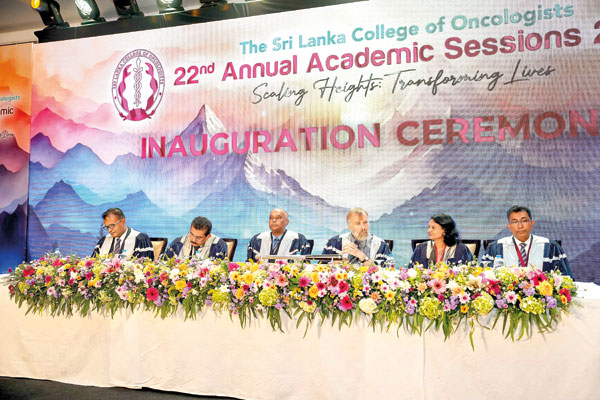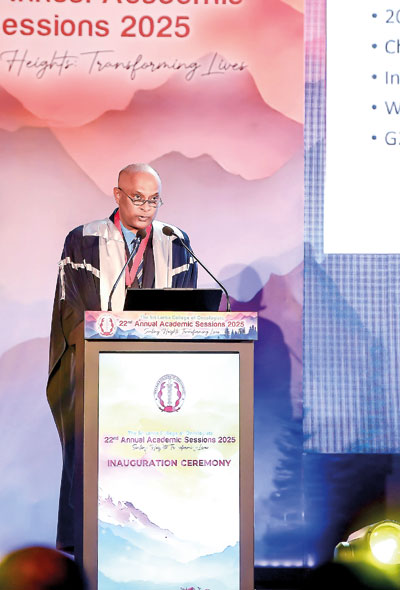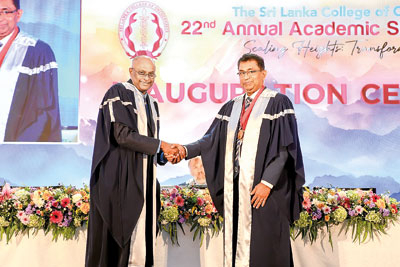News
‘Radiotherapy, chemotherapy and surgery, three main pillars of quality cancer care’
View(s):- SLCO President Dr. Sanath Wanigasooriya underscores the importance of radiotherapy as one of the most cost-effective modalities of treatment
By Kumudini Hettiarachchi
It is feared by all and sundry – cancer is a dreaded disease, with the incidence in Sri Lanka nearly doubling during the past decade.
To achieve ‘quality’ cancer care, a strong framework has been proposed by the President of the Sri Lanka College of Oncologists (SLCO), Dr. Sanath Wanigasooriya.
Addressing the inauguration of the annual academic sessions of the SLCO on August 22, on the theme ‘Scaling Heights: Transforming Lives’, he said: “If we imagine our ultimate goal of a successful cancer care system as the roof of the house we want to build, there are three main pillars which will keep this roof aloft – radiotherapy, chemotherapy and surgery.”

At the head table (from the left): SLCO Secretary Dr. Jaliya Jayasekera; Chief Guest & Health Secretary Dr. Anil Jasinghe; SLCO President Dr. Sanath Wanigasooriya; Guest of Honour & Professor in Clinical Oncology, Christie NHS Trust – UK Prof. Peter Hoskin; SLCO Immediate Past President Dr. Umagowry Saravanamuttu; and Orator Dr. Prasad Abeysinghe
While underscoring how “beautifully” the theme captured both the journey the SLCO has undertaken and the ambition that lies ahead, he elaborated on the three pillars of radiotherapy, chemotherapy and surgery which needed to be built on a strong foundation, the key ingredients of which would be research, data and professionalism.
“We oncologists are not just medical professionals – we are agents of change. Each patient, each challenge, each improvement is an opportunity for a step upward. Each clinical decision, each policy we shape, each barrier we remove, becomes a foothold on the mountain of progress – a mountain we are still climbing together,” he said.

Dr. Sanath Wanigasooriya addressing the gathering
Placing radiotherapy under the spotlight, Dr. Wanigasooriya said that often it is under-appreciated, but for countries such as Sri Lanka, it is one of the most cost-effective modalities of cancer treatment. Although requiring significant initial investment, it is estimated that up to 40% of cancer cures are attributable to radiotherapy, while around 50% of all cancer patients receive radiotherapy during the course of their illness.
Looking into the past, he said that in this country, radiotherapy began in the early 1970s with a single cobalt-60 machine at the National Cancer Institute (NCI) at Maharagama. Over time, centres were established in Kandy, Galle, Jaffna, Badulla and Anuradhapura, with a leap being seen in 2008, with the installation of the first linear accelerator at NCI.
In 2013, the Health Ministry launched a two-phase project to provide high-quality radiotherapy, which entailed the acquiring of 14 linear accelerators; getting brachytherapy machines on a staggered basis to cover all the provinces; and installing CT (Computed Tomography) simulators and dosimetry equipment to cater to the whole country.
With the completion of Phase 1, there are 10 linear accelerators in the five centres of Kandy, Batticaloa, Jaffna, Galle and NCI. When Phase 2 which is underway is completed, there will be at least one high-end radiotherapy machine in each of the nine provinces, he said, happy that today “we are almost at the cusp of fulfilling this aim”. However, this is far from adequate.
According to international standards, the country would need at least seven more machines even after the completion of Phase 2 to meet the present demand, he said, stressing that a lack of machines not only hampers timely treatment but also limits the ability of highly-trained oncologists which can result in frustration and contribute to brain drain. He appreciated the ministry’s action in prioritizing this issue.
Moving onto chemotherapy, Dr. Wanigasooriya said that when cancer spreads beyond the primary site, systemic therapy becomes essential. Even when a cure is not possible, it prolongs survival, alleviates symptoms and enhances the quality of life. Sri Lanka is among the few countries where all chemotherapy medicines are provided free of charge in the public health system.

Dr. Sanath Wanigasooriya and Dr. Prasad Abeysinghe who delivered the Dr. Kumar Weerasekera Memorial Oration on ‘A second chance at life: Establishing the first National Bone Marrow Transplant Unit in Sri Lanka’
He urged that the first-ever Priority Medicine List in the country developed with the input of the SLCO during the 2022 economic crisis to ensure the availability of essential drugs should be updated regularly with new evidence on efficacy and cost-effectiveness.
Sri Lanka successfully joined the WHO/St. Jude Global Platform for Childhood Cancer Medicines (GPCCM), one of the first 12 pilot countries to receive quality-assured paediatric cancer medicines, thanks to the support of the ministry.
Zeroing-in on surgical oncology, he said that it has been at the “heart” of cancer care in the country since the inception of the NCI and has now expanded across the country. However, barriers such as inadequate theatre time, scarcity of ICU beds and insufficient diagnostic facilities (mammography, CT/MRI, endoscopy) remain.
Dr. Wanigasooriya stressed the importance of cancer registries, while seeking a clear view with regard to the challenges including gaps in infrastructure and workforce; delays and barriers to accessing timely treatment; underdeveloped survivorship care and psychosocial services; and lack of robust national data for effective policy-making. Innovation would be the way to overcome these challenges and it does not always mean expensive technology but identifying smarter, simpler and more sustainable solutions.
Seeking the empowerment of patients beyond treatment, he said: “We must also look beyond the disease. True transformation comes when we restore dignity, confidence and hope. This includes emotional support, reconstruction and prosthesis for missing body parts, wig donation programmes and survivorship programmes.”
Early detection of cancers is undoubtedly more cost-effective than treating advanced cancers. Therefore, community-based screening for selected cancers is a low-hanging fruit that is currently ripe for the plucking, when it comes to improving outcomes of cancer patients in the country, said Dr. Wanigasooriya, adding that the SLCO should be the driving force that bridges science with policy, hospital with community and technology with humanity.
The best way to say that you found the home of your dreams is by finding it on Hitad.lk. We have listings for apartments for sale or rent in Sri Lanka, no matter what locale you're looking for! Whether you live in Colombo, Galle, Kandy, Matara, Jaffna and more - we've got them all!

